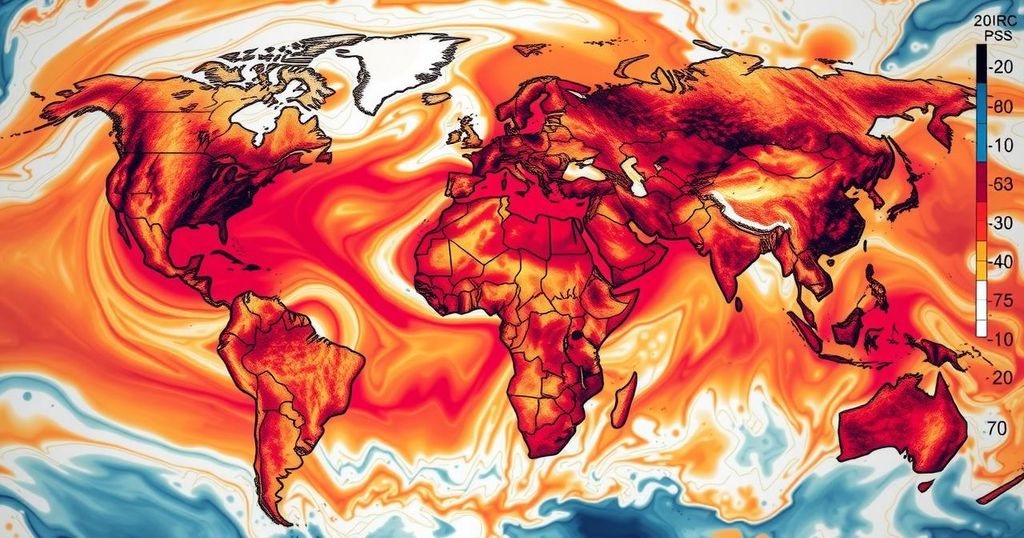Copernicus Reports Earth Likely to be Hottest Year on Record Again

The European climate agency Copernicus reports that, for the second consecutive year, Earth is forecasted to become the hottest on record, surpassing 1.5 degrees Celsius of warming compared to pre-industrial levels. This phenomenon, driven primarily by greenhouse gas emissions alongside other climatic factors, signals urgent action is needed to mitigate the escalating impacts of climate change. The report arrives amid political events and anticipatory discussions at COP29, where crucial decisions on climate adaptation funding are expected to take place.
The European climate agency Copernicus has issued a stark warning that, for the second consecutive year, the Earth is predicted to become the hottest it has ever recorded. This alarming trend is marked by temperatures exceeding the 1.5 degrees Celsius threshold compared to pre-industrial averages for the first time. Carlo Buontempo, the director of Copernicus, emphasized the unprecedented nature of this warming, driven predominantly by greenhouse gas emissions alongside other factors such as El Niño and variations in solar energy. Such extreme temperatures signal a worrying trend in climate change that demands immediate global attention and action.
The timing of this report coincides with significant political events, including the re-election of Donald Trump, a politician skeptical of climate change, and the imminent COP29 climate conference aimed at mobilizing financial resources for clean energy transitions. As the environment increasingly succumbs to extreme weather events, including heatwaves and natural disasters, the call for urgent adaptation financing has been echoed by U.N. Secretary-General Antonio Guterres, who indicated the severe consequences of global warming.
Furthermore, it is critical to note that while this year’s spike in temperatures exceeds the 1.5 degrees Celsius mark, it does not imply a deviation from the long-term global warming trend, which continues to pose significant challenges. Scientists express concern that the current goals for greenhouse gas emissions reductions remain insufficient to achieve the targets established at the 2015 Paris Agreement. As experts predict the harsh future without intensified action, the urgency for comprehensive climate solutions takes precedence.
As stakeholders prepare for the upcoming climate negotiations, the emphasis must be placed on making informed decisions based on empirical evidence, emphasizing the necessity for international collaboration to confront the climate crisis and mitigate its expansive impacts.
The continuous rise in global temperatures marks a crucial turning point in climate science; thus, it becomes imperative to reposition efforts towards increasing funding and effective climate adaptation, emphasizing fairness and equity in response efforts.
Ultimately, the choices made by society and policymakers at this juncture will determine the course of future climate action and the well-being of vulnerable populations impacted by heating consequences.
Addressing climate change must become a collective priority, grounded in factual assessments of the existing and forecasted environmental conditions.
The report by the European climate agency Copernicus highlights a critical situation in global warming, emphasizing that the current year is likely to set a new record for the hottest temperatures. This continuing trend poses significant environmental challenges, necessitating urgent measures to combat climate change. The escalation is attributed to increased greenhouse gas emissions and other climatic factors like El Niño, which can affect global weather patterns. As climate change progresses, the need for policy changes and financial investment in clean energy solutions becomes imperative. The report coincides with upcoming climate discussions driven by the UN, indicating a heightened awareness of the urgency to address these pressing issues. The stakes are elevated, with leaders and scientists alike underscoring the potential consequences of inaction.
In conclusion, the warning from the European climate agency presents a critical moment in the global response to climate change. With the Earth reaching unprecedented heat levels and exceeding the 1.5 degrees Celsius threshold for the first time, it highlights the urgent need for substantial adaptation efforts and financing. As global temperatures climb and extreme weather events become commonplace, the decisions made by governments and societies regarding climate policy will have pivotal implications for the future. Addressing climate change requires a unified approach grounded in scientific evidence to ensure effective and equitable solutions are implemented. The time for decisive action is now.
Original Source: apnews.com






